Friday, October 31, 2008
First snow signs
Today is cold right now, before the dawn, but will be sunny. My crew is back out at the Alpaca farm, so we should have a good day. Tomorrow, Saturday, I'll pick up the yard. Or lose my gear!
I'm in the habit of keeping equipment for the tractor around the edge of the school bus and plow truck turnaround that is really our driveway. This works fine for spring, summer, and fall. In the winter, the plow truck seems to go around that turnaround at about 50 miles an hour, and anything not removed from the danger zone will get a full broadside and like as not be flipped over, or worse, through the sheep fencing.
We will get our first four, six, or twelve-inch snowstorm sometime between now and December 20th. In year's past, according to dairies like that of Jonathan Wright, a Great Farm neighbor in the late 1800s, Jackson could confidently expect it's first snowstorm before Hallow'een.
Once the first storm comes, chances are good, 75-25, that the snow sticks and accumulates with the second and third, until we have several feet on the ground, and huge piles of plowings all around that loop road, which becomes a kind of giant snow fort. Sometimes, though, the first storm melts and refreezes, and we have two or three weeks of soggy then icy mess until the second.
We will have between six and ten storms each winter, of which four or five will be heavy, over twelve inches, and require us to change our plans for the day while we get plowed out and plow ourselves out. Being at the end of the road, our chances of getting snowed in for eight, ten, twelve or even twenty-four hours are pretty good. The occasional winter brings a storm that has us snowbound for two or three days.
Something to look forward to. I always enjoy the readjustment of values that occurs when a workday is terminated by a major storm. My usual response is to throw another log on the fire, put on a pot of beans, and take it easy.
Tuesday, October 28, 2008
The Holy Ground.
(These guys, an Irish band called the Dubliners, look like they could be members of my family.)
The weather of late fall and early winter in this part of Maine includes wind. Which is good. For me at least.
I like the seasons and, being British, expect winds around the equinox. These are no disappointment. They already blew a chunk of asphalt roll roofing off our own small Womerlippi sheep barn. We had several short power cuts, one long enough for me to at least start the emergency job of finding all our battery packs and inverters to provide temporary light and to keep our freezers running. They blew down some small dead trees on our road. And they completely blew down a part-built barn owned by our local alpaca farm, Northern Solstice Alpacas.
Consequence being, I spent most of Sunday morning fighting flapping wet gritty roofing felt in a fresh gale with driving rain, and my students and I spent much of yesterday afternoon, between gales, rebuilding an alpaca barn. I quite enjoyed both experiences. There's something about a good stiff gale that gets my British blood going. And, when it's all over, you feel just a little bit more alive as a result.
Aimee, although she enjoyed the experience less, being an American, was good, and brave enough to hold my ladder Sunday. The barn is 18 feet high. It gets windy up there. the ladder would blow down by itself, already had, and I didn't want to be trapped on the roof. A couple gusts had me thinking I might soon learn to fly, without really wanting to know the technique, nor time enough to learn it. I also cursed, not for the first time, my lack of a roofing-nail gun. The nice thing about a nail gun, is it only takes one hand to operate, giving you another to hold on for grim death, or to hold down the new roofing before tacking it down. I have a framing-nail gun, but not a roofing-nail gun.
The alpaca ladies, probably wisely, left us to our own devices to rebuild their barn Tuesday. We had enough help to hold any number of ladders. And a suitable nail gun.
Our student construction crew is now fairly well-trained and experienced, and knows most of the tricks it takes to make construction easy, safe and accurate, like building framing tables and saw tables first so you work at waist level standing up, not ground level kneeling down. Measuring twice, cutting once. They also figured out the use of wind braces PDQ, and we attached several to the barn as we put up the frame sections, and a bunch more on completion of our work day to help the part-built building survive the new gale. I expect it to stay up, this time.
Now, as the old song goes, the storm is raging, and we are far from the shore of calm days. It's midnight in Maine, and I just went out to check around the farmyard. Everything seems fine, and seems to be sticking more or less where it belongs, including the barn roof. So far, so good. The biggest gust tonight was only about 30 mph. The National Weather Service was predicting sustained 40 mph winds, and gusts to 50 and 60. Our house doesn't even think about moving until gusts reach 40. It's been on this spot a long time, and has a better windbreak now than it probably had in previous years, while I already removed all the trees that were closest to the house that could have fallen on it.
It's supposed to settle down a bit by the weekend. Hopefully no-one else's house is getting tossed about either, and all the ships in the Gulf of Maine have made port.
This is one of those nasal songs we used to sing in pubs and Land Rovers when I was in the service. I do believe I even know it on the penny whistle, although I play the penny whistle rarely, now my old dog Liza Jane is no longer around to join in. A good song for a windy day. The kind my wife doesn't like. Maybe if she gets tossed around in gales a bit more, she'll get used to them.
(Either way, she's the girl I do adore.)
The Holy Ground
Fare thee well, my lovely Dinah, a thousand times adieu.
We are bound away from the Holy Ground and the girls we love so true.
We'll sail the salt seas over and we'll return once more,
And still I live in hope to see the Holy Ground once more.
(chorus)
(Shouted) Fine girl you are!
(Sung) You're the girl that I adore. And still I live in hope to see the Holy Ground once more.
(Shouted) Fine girl you are!
Now when we're out a-sailing and you are far behind
Fine letters will I write to you with the secrets of my mind,
The secrets of my mind, my girl, you're the girl that I adore,
And still I live in hope to see the Holy Ground once more.
[chorus]
Oh now the storm is raging and we are far from shore;
The poor old ship she's sinking fast and the riggings they are tore.
The night is dark and dreary, we can scarcely see the moon,
But still I live in hope to see the Holy Ground once more.
[chorus]
It's now the storm is over and we are safe on shore
We'll drink a toast to the Holy Ground and the girls that we adore.
We'll drink strong ale and porter and we'll make the taproom roar,
And when our money is all spent we'll go to sea once more.
[chorus]
Monday, October 27, 2008
Happy Hallow'een

Hallow'een is a holiday Americans keep to make sure their pious don't get too pious.
After all, what could be more overtly pagan? Obviously anyone who observes Hallow'een doesn't take religion too seriously, which I think is probably healthy for you.
I always enjoy the pumpkins. Who wouldn't want to make one of these? Even if you don't have little kids?
Back home in the yUKe, we had Hallow'een, but it was far less of a big deal than the following holiday, "Bonfire Night," or "Guy Fawke's Night," a holiday to celebrate a failed Catholic insurrection, the Gunpowder Plot.
My mother's birthday, too. Happy Birthday, mum.
Bonfire Night was a religious holiday at least at root, although the religious aspects went right over the heads of us kids, and even my Catholic buddies went to see the fireworks. The torchlight parade, on the other hand, featured fife and drum and bugle marching bands from the Boy's Brigade, the "chapel" version of the Boy Scouts.
I should explain "church and chapel." In 1960s and 1970s Sheffield, as in Wales, and most other northern and western outposts, if you were not of the tiny Catholic, Jewish or Muslim minorities then existing, you were either church, or chapel.
Meaning your family loyalty was to conformism, and Anglicanism. This was my mother's side. Or to non-conformism, and Methodism. My father's side. And the Methodists, like the Presbyterians in Ireland, were closer to the ideals of the Civil War Roundheads and hated Guy Fawkes and all he stood for. So Bonfire Night was still a big night for the Boy's Brigade or formerly the Church Lad's Brigade.
The fireworks displays were all over the city that night, but the closest one to us was at Coldwell Lane sports field, where we kids would play milk-crate cricket all summer and sled in winter. Mother would cook a special dinner of baked beans and baked potatoes, and the neighbor kids would gather at our house because we were on Sandygate Road, the main route for the march-past. There would be toffee, sometimes toffee apples. I can still feel my teeth getting stuck together. The sled hill was the fireworks hill. A massive bonfire of scrap lumber and brush was lit, about fifteen feet high. The torchlight parade would come to an end, all the kids throwing their torches on to start the bonfire, which had been primed with an effective accelerent and would just light right up. Then all the kids home-made "Guys," the effigies of Mr. Fawkes himself, were flung on to roast.
Poor Guy.
The the fireworks would begin. A small squad of dedicated pyromaniac fathers and grandads tended these, and the "oohs and aaahs" went up into the night with the sparks from the bonfire.
A good night was had by all.
If we kids or our parents had any clue we were re-enacting the English (and lowland Scottish) public hatred for a failed Catholic terrorist, and his execution, no-one let on. It wasn't until I came to America that I realized what the deal was. And how violent a holiday it was. With the uniforms and torches and fire and burned effigies! Shades of Nuremburg.
I expect the fundamentalist religious authorities in America who hate Hallow'een because it's pagan at root would approve of Bonfire Night if they thought about it. After all, these outfits are really just spin-offs of British non-conformism; all of them offspring of the seventeenth century social and political upheavals in England and Scotland. The burning times.
Not that they would wish to know this.
Sunday, October 26, 2008
Snorri the studmuffin

Snorri is a two-and-a-half-year old Corriedale/Romney cross Ram who belongs to Chris and Betty Beach. They just dropped him off for the breeding season. He will cover ewes Maggie, Mollie, Nellie, and possibly Lark. These are all offspring of the current Womerlippi stud, Abraram, and so he shouldn't breed them.
Instead Snorri gets the pleasure.
But don't feel bad for Abe. He has his regular harem of Tillie, Tootsie and Jewel.
Snorri, named for a viking baby from the Greenland/Vinland Sagas, is a big chunky guy, a much wider load than Abraram, although the latter is much taller.
We'll keep the two rams separated by two fences and about ten yards for the duration, or they might go to work on each other.
It will be interesting to see who gets bred, who gives birth to what color lambs (Snorri is a natural colored brown-grey not unlike Tootsie), and how many lambs we get total from 7 ewes.
The reason we expect Lark not to get bred is, well, let's just say she's always been a late bloomer. Likely malnourished as a lamb, she never quite filled out until this year, which is her third. Now she's the size of a healthy two-year old, but we can't tell if she is sexually developed. She's also a little soft-headed, and unlike the other sheep, doesn't know to avoid the worst of the manure and mud.
Who knows? Maybe she'll surprise us all.
The other ewe that likely won't get bred is great aunt Tootsie. She's a little long in the tooth.
Friday, October 24, 2008
Musically and culturally dissed...
This happens all the time. I had a fairly traditional British upbringing, and various formal, folk and traditional songs were part of the mix. We sang songs at church and school, traditional Anglican hymns I still love. We sang in the Boy Scouts, including a lot of rather silly songs like Ging gang goolie. We sang on school bus trips and hiking trips as young kids. We sang, surprisingly I know, rather a lot in the Royal Air Force, both generally during basic and trade training and at various parties and piss-ups where service songs dated to the Second World War were sung, like "I don't want to join the air force...". We also sang in RAF Mountain Rescue, where the folksong culture is actually quite well-developed, to the point that during the '70s and '80s the teams had an endless font of songs profane and sacred to the hills, some of which were entirely their own, others traditional to the countryside, and we could sing away a pub "lock-in" until the wee hours, or make a long Land Rover drive seem short.
Those were the days for singing. I miss them.
My family was also musical, and boasted, among other leading lights, a sainted but long-dead uncle who was Dean of Music for a famous northern cathedral, several high rankers of the Sally Army and a large number of choirboys and music lesson refugees.
So I occasionally like to sing. What's wrong with that? (He says somewhat defensively.)
What's wrong with is is that my wife hates it.
She comes out with all kinds of excuses, including that her own family never exposed her to very much music. Which is bulls..t. Her mother and multiple aunts made up a renowned Church of the Brethren singing group in the Pennsylvania and Virginia countryside, and mom is still a church chorister to this day. Dad-in-law's tastes run more to Jimmy Dean and the man-in-black himself, but all perfectly singable stuff that Aimee knows much of by heart.
No, what my wee wifie hates is my English and Scottish folksongs. She says I sing nasally.
Of course you sing nasally. Doesn't she know that's the way you sing many of these songs?
Oh well. I can always sing to myself. Or the sheep. Being of British extraction themselves, via New Zealand, they don't seem to mind.
Monday, October 20, 2008
Garden snooze
The remaining tomatoes and peppers were pulled and separated from the fruit and cages, and stacked in one heap for compost. The pig-sty was cleaned out with the tractor loader - slight near-disaster there when I didn't notice the lug nuts had fallen off the Kubota's right front wheel. Now I need two special Kubota M17 fine thread nuts, from who-knows-where. Hopefully they still make them.
All that pig manure was well-rotted, but it made a fine big compost heap mixed with a little remaining sheep bedding. In the spring we'll till this into the garden before making raised beds. Then the ground was tilled with the Kubota rototiller, a fine piece of equipment and without a doubt the best tiller I've ever had or seen.
Gardening is like that. You put the plot "to bed" in the fall. In the spring, you make the beds.
Once the sty was cleaned up, the fence went back from wence it came, and hey presto, no longer a pig sty but a small outdoor sheep pen suitable for winter confinement, with access to a warm dry pen in the barn, which of course is where their hay is stored.
It all works together pretty well, livestock and garden, for fertility, animal health, convenience and in reducing hand labor by using the Kubota wherever it will fit. I was left with about thirty-forty shovel fulls of manure that I couldn't get by tractor, but that just ensured a good night's sleep.
No other tractor could do all this. The other brands are just too big for our operation. But any larger an operation would likely defeat us in terms of the hand labor that would remain -- feeding, shearing, hoof clipping, planting, weeding, picking and most labor intensive of all, putting up.
As long as the wheels stay on, the 1973 Kubota will be the pivot-pin of our system. If it ever dies, we'll have to change everything, or get an identical replacement.
Oh, and there was another problem with the tractor -- it was almost out of coolant. Earlier I had lent it to a student for tilling the college garden, and she had complained of over-heating. I'm afraid I dismissed this, more or less, because it leaks a little oil from the rocker cover, which burns on the hot engine, and so it always smells like it's overheating. But this time it really was. Luckily the thing shuts itself down when it gets too hot, so by the time it had done this this a couple times, I stopped, let it cool off (while I had lunch) and then checked the coolant.
Sorry, Sara. I should have believed you the first time.
Afterward, the tractor ran fine, so no damage happened to the engine. Why the coolant is being lost is another question, but since I've had the tractor now for a year and a half, and only checked the coolant level twice, once at the beginning and just now, I'm not too worried. It's likely a small chronic drip somewhere.
There's one on the truck like that, a tiny drip, a small stalactite of crystalized green goo, and you need to put in a half-gallon every six months. The coolant never really reaches the ground. It just gives you an incentive to crack the hood and check on things. As if I needed one.
Sunday, October 19, 2008
Heating season
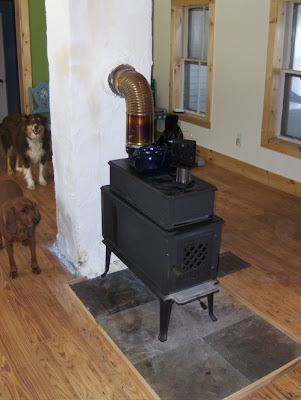
The first hard frost arrived very late, October 18, and finally killed off our peppers, which had surprised us by surviving several light freezes. Now it's time, finally, to put the garden to bed.
Not before we strip the peppers and dry bean plants. We will need their heat later, when the snow is three feet deep and we worry it will never leave. When it's 15 below, and you just came in from shoveling snow, feeding critters, or trying to start the tractor for a little light snow removal (a little?), then any peppery food feels really good. I don't understand why traditional New England bean recipes, otherwise such warming and bio-regional fodder, generally do not include this other source of internal heat.
My guess is, they did, but the recipes were later cooled down to accommodate more mid-western tastes. My guess is, the real New Englanders of yesteryear knew the value of a little capiscum. They must have. All that foreign trade. Are you telling me old Israel Thorndike, founder of the Great Farm, never brought a little hot stuff back from his eastern voyages? If so, the man was less of a firebrand that has previously been reported.
I generally make tomato concoctions out of the peppers, frozen or canned enchilada sauce or salsa. They go further that way. My father-in-law's patent hot-pepper jelly is also a perennial favorite. A little of that goes a long way on a chip or on scrambled eggs. It especially goes a long way to clearing out your terminally swollen sinuses, which in our case, and like all college professors' nasal passages, somehow are required to survive an annual onslaught of exotic common cold and flu viruses brought just for us by our students as they collectively visit every state in the Union each Thanksgiving, Christmas, and Spring Break.
That Florida spring break thing should be baned for public health purposes. No just for infections of the respiratory tract, but of other bodily tracts too.
The students could assist us by reducing the efficacy of their microbiological collecting expeditions. If they'd only learn to wash their hands. (And stop screwing strangers.) But pepper is the antidote. (For one out of two ailment categories.) And the humble bean the best inert ingredient for the medicine.
Our other great climate-changing device and source of winter comfort is the woodstove. Ours is puttering contentedly in the kitchen with one pot of beans and another of oatmeal on the top. Woodstoves, actually, plural, if you count the industrial strength hot-air wood-burning device that sulks in the corner of my shop as such. It's actually more in the way of a blast furnace.
You can use it to bend iron, and I have.
Both of these devices survived their own onslaught this year, this one by the insurance company. Ours threatened to cut off our coverage unless we had both devices examined by a "licensed, insured, professional." All insurance companies, sensing loss due to increased use of wood stoves, are on a similar fire-safety campaign in Maine right now. Slight problem is, there is no such thing as a licensed wood stove contractor in the State o' Maine. The state does not issue licenses for wood stove or chimney contractors. And few contractors carry the kind of insurance that would actually give the insurance companies any liability help in the case of a real house fire. Presumably the companies would resort to suing individual tradesmen. The local firemen have stepped in and are doing the rounds making inspections in a fairly ad-hoc way, considering they aren't really trained to do so. This is public spirited of them, but will only will last as long as it takes for the first fire department to be sued by the first insurance company.
The upshot is, many low-income Mainers are forced to choose between cheaper heat, or expensive insurance, or no insurance at all.
One silver lining in this whole credit debacle is that insurance outfits are losing money too. That might force them to reduce their efforts in this regard. This would have the effect of causing more house fires, of course, but there these additional fires would all be in insured houses. And Mainers would be warmer if not safer.
There are always trade-offs. For the loss of some insurance company profit, for slightly riskier houses and some additional deaths and injuries at the margin, thousands more Mainers could afford to be warmer and better off financially this winter. I don't say it would be worth it. But I object forcefully to the profit-motivations of insurance companies in this crack-down.
We solved the problem in an unusual way, for us. We got help. And we spent money. We argued over what to do a little, but in the end Aimee did what she usually does with money matters, and left it up to me. I used home equity credit, of which we had accumulated a bit to spare, to do two expensive projects this summer. One was to pay for new, professionally installed, very high quality chimneys throughout the house. The other was to pay for the materials and the time of a good friend who helped me put in a new septic system. I then off-set the new chimney costs a little, about 40-50%, by making all my own firewood for the first time in years. I was able to do this because I had no summer work at college this year, or very little, and no really serious building projects at home.
(Just the porch rebuild, a whole septic, a replacement sill, and the completion of our foundation repair, that's all. Not too much.)
The upshot was, we have really safe woodstoves, much safer than before. A tiny roof leak that was annoying in wet weather, and that I had been unable to trace with repeated efforts, also got fixed. But when Aimee's little car failed inspection, and I had to think about how I might replace it, there was no money left to use. So in a way, we're less safe because we were forced to fix our chimneys before we naturally would have done so, and for more money, that in the end prevented us from replacing a car. The new car would have had front and side air-bags, better brakes and better steering. Luckily the old one passed on the second try, and gave us a year to plan how to get the Honda Fit of Aimee's dreams.
(I'd rather have an old diesel Land Rover, but I don't have a vote in this decision.)
There are always trade-offs. And I feel I'm in a better position to decide safety priorities in my own life and home than insurance companies are. I make us as safe as I possibly can, given that money is always tight. I take great pride in it. Frankly, we're more likely to die of a bug from one of our students than from a house fire, especially given my obsession with smoke alarms.
And I'm still mad about the way the insurance company treated us.
In particular, the way the regulation was enforced was shabby and two-faced, with the local broker advising us to do more or less a cover-up job of declaring we had removed the woodstoves, deceiving the head office about it, mostly just to keep our business. While the head office staff were rude and uncooperative and couldn't even properly explain their own policy.
And I will get even. We have a different company, the one that insures the Bale House. If it hadn't been for a recommendation from the lady at the credit union that gave us the mortgage, we might have stuck with this old firm, who have solved several difficult problems for us in the past, and done so inexpensively. We will switch in April, now that we aren't going to lose coverage and so remain eligible to do so. I'm not naive enough to presume that the new company will be any better than the old. But I do feel that the new broker is more intelligent, professional and honest, and will do better for us in the end as a result.
In the meantime, my woodstove makes me very happy, as it has always done. Here's a picture of it in the old installation, with the offending chimney, no removed. We are a little glad to get rid of all that masonry.
Thursday, October 16, 2008
A belly-full of the beast
But as usual, it reminded me of how grateful I am for for my wife and home. And why I don't live in the city, the suburbs, or indeed any place in the country that has been "found" by wealthy folks yet and gentrified accordingly.
Then I returned, and, happily situated on the couch with Aimee, watched Jon Stewart on TV. There was a skit on the stock market crash, lampooning survivalists: how folks would be better off with food and weapons and the ability to make fire than with stocks and shares right now.
No shit. And no joke.
Aimee and I aren't survivalists by any means. But I'm especially pleased this recession winter to have all my firewood and hay in, all my food put up or frozen, and my house and barn tight and warm against the coming cold. I'm also happy that we aren't over our heads in mortgage and consumer debt to pay for this. We could, if need be, get by on one income if the other took a few hours work. We have more than enough food and fuel for the winter. We won't have a heating bill, and our efficient lights and appliances mean our electricity bill will be low.
Being homesteaders: providing our own heat fuel, meat and vegetables, fixing up our own dwellings, vehicles and equipment, and making much of our own entertainment, is really a third income to us, and it means we can afford to live, and live well, which is more than we can say for many other Americans right about now.
What's so funny about that? Sounds like a good idea to me.
City dwellers often look down on the country. Country pastimes like hunting and fishing seem idiotic to fashionable urbanites. And who wants to deal with all that manure and hard work? Life without easy access to theatre, music, movies? No fashion? No expensive cars? Fancy furniture?
Sounds great to me.
The urban life is way over-rated, both in terms of security and convenience. There's nothing at all secure in most urban employment. You're at the mercy of the employer or the markets. And there's nothing convenient about the crowding, pollution, crime, and stress of the urban environment. Most urban pleasures are intense, it's true, compared with, say, watching sheep play, or watching the leaves turn and fall.
But the problem with intensity is that you forget to breathe, you're not as conscious of your own life, your body working, your heart breathing. You have to make yourself exercise, in a gym or on a track. It doesn't come naturally and smoothly out of your work. You will carry far more of the stress hormone cortisol in your system than is good for you. You won't enjoy or digest your food properly. You will worry about silly things that might otherwise be benign or even pleasurable, like getting old, or getting wrinkles.
And you will naturally miss a good deal of your life that way.
Jefferson thought that the yeoman farmer was the root of democracy and national security. Patrick Geddes thought that equities markets and other more liquid forms of wealth were illusory and that the only real source of wealth could be found in homes, farms, and gardens. Aristotle, Ruskin, Leopold, and Cobden all warned of the dangers of urban money-grubbing, as compared to rural dirt-grubbing.
I'll stick to my dirt-grubbing. I'm thinking about a little diversification in my portfolio, though. Vineyards, maybe, because we need to think of crops that will resist the climate change brought on by urbanism. A milch-cow for Aimee's cheese, some gentle doe-eyed Jersey? Maybe I should just junk these junkers and get a buggy horse again?
Ah, the stress...
Saturday, October 11, 2008
Chicken-scratchin' good


The Womerlippi Farm critters have been getting some fancy feed lately.
Olivia Pig got a bowl of peaches, blueberries and cream the night before she went to meet her maker. Leftovers from a child's uneaten dessert, she loved it. It also made me feel a little better about doing the deed.
The sheep had some over-ripe Concord grapes yesterday. Sheep love sweet grapes.
The dogs will get some calf-liver today, to help clean out our freezer prior to the arrival of our fat lambs, in chop formation.
And finally, here are chickens scoffing down Aimee's stale breakfast cereal.
Feeding farm animals tasty tidbits that would otherwise go to waste is a treat for us too. Better than TV.
I didn't get my camera out, but watching Aimee blow soap bubbles for sheep to investigate was also better than TV. It's the way they jump when the bubbles pop.
I heard on the radio that potential First Dude of the United States, Todd Palin, is coming to Palmyra, just north of us. I have to go close to there today to pick up the lambs. I don't think I want to make a detour to see the show. As far as I'm concerned, until his wife regulates her views on climate change, teaching evolution, and a whole range of issues, Palin should stay away from this one tiny enlightened corner of the country that doesn't think such antedeluvian views are reasonable.
I don't know why he would bother anyway. Maine will go for Obama. The only possible reason is that Maine does have a kind of proportional representation in the way it seats its Electoral College delegates, so there may be a few delegates for McCain at stake.
If so, McCain should come here himself, not send a ridiculous Alaskan attack dog.
A token gesture.
That's likely to backfire here in Maine, thankfully.
Thursday, October 9, 2008
Bringing home the bacon
While homesteaders in Aberdeen, Raasay, and southern England are not yet engaged in this occupation, or haven't yet experienced the pig experience.
It's recommended.
Although the butchering makes me miserable, the aftermath makes me glad. Bacon, chops, sausage, pork roast, ham, and fatback for lard and baked beans. "There's a whole world more to a pig than ham" said Renee Zellwiger's character Ruby, in the movie and novel Cold Mountain.
And there is. And we have it. This is the bacon bonanza season at Womerlippi acres. One pig is home already, one is yet to come, but we are already porked up to the gills.
We give some away and we trade off some, but we also keep some for me and our guests to eat. My wife, although raised on Pennsylvania and Shenandoah Valley German Pietist pork products (the finest kind), eschews meat still. She's vegetarian less by conviction and more out of shear cussedness. She turned that way to spite her parents when she was a teen, and stayed mostly out of stubbornness.
Being British to the core, I appreciate this stubborn trait in her, and do my best to eat her share. It's only fair I should pitch in.
Sunday, October 5, 2008
Cheese and whine party
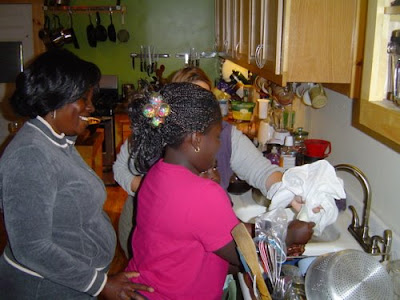

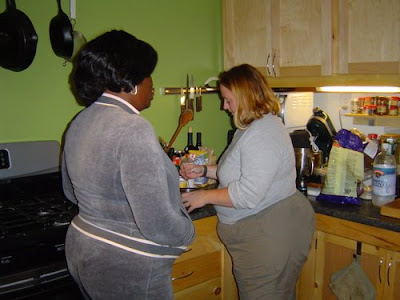
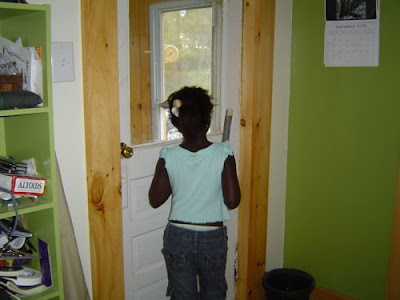
We had our friend Vida and kids over to dinner and Aimee showed the two girls how to make cheese.
Neither kid had patience for the kneading part. Whined little S-A, "I want go out out and play with the bubbles." (A big bubble-soap toy that Aimee got at WalMart.) Opined older sister Vanessa, "This is boring now."
But the two women, Aimee and the kid's mum Vida, made them stay and watch and knead to the end. Kids will be kids, but I think they have to learn patience by practicing it.
And then they got to eat cheese.
Shirley-Ann thought the cheese tasted great. Vanessa thought it too mild.
You can please some of the people some of the time.
Slaughterhouse Five
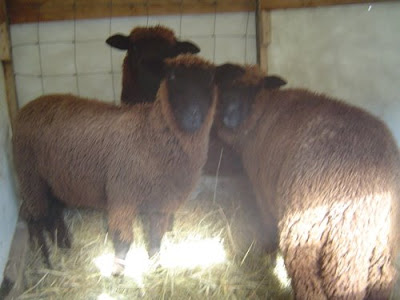
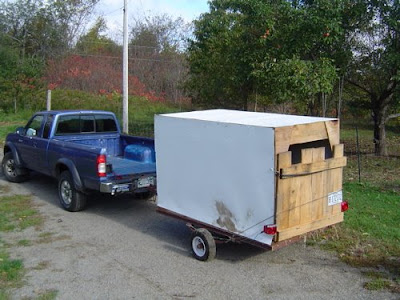


The fall butchering at Womerlippi Acres is well under way, and as usual it's making me miserable.
I hate this part.
Of the five animals we will slaughter and eat this coming year, only one is left, Ophelia Pig, who is actually my favorite pig of all the pigs I've ever had -- so sociable, so pleased to see you when you go to the barn. The under-pig too, dominated for almost all of her life by her big brother Hamlet, now made ham. If I could, I'd keep and breed her, but we don't have facilities, or time, or money, to deal with her when she gets to be 400 pounds, and has 12 kids every six months.
If I lost my job tomorrow, I'd probably go into pigs, natural or organic pork, just because it's the kind of farming you could do on 15.5 acres and actually succeed. And I'm fond of pigs. And O-girl would make a great starter sow. She has the long back of the Canadian line based on the old Yorkshire Landrace, a prime sow for bacon and chops.
But there's the small matter of 50-60 hours a week at Unity College. I don't have time to watch over and feed that many pigs. Herself would have to be bred in three-four weeks, so there would need to be a boar or some semen found soon. And where would the sheep go for the winter? The farrowing pen would probably be their spring lambing pen, currently occupied by ducks. All far too complicated. Life is messy enough as it is.
I don't want to truck her today, but I pretty much have to. And although I wanted to truck the others, I hated it, especially the wether lambs, who were pitiful.
The lambs went yesterday, a day ahead of schedule, but the butcher shop called to say Hamlet was ready, meaning cut up into pieces and frozen, and I should come get him. They wanted their freezer space. I wanted the lambs gone. It was a deal.
The wee lambies went quietly until the end. They loaded easily, were content to be in the trailer, didn't struggle. Until they smelled the butcher shop. Then they had to be pushed out of the trailer into the holding pen, and they were just pitifully sad when I left them.
Betrayal. Total and utter betrayal. What a total b......d I am.
But, b....d that I am, I was happy to come back with the 100 plus pounds of premium pork products that were once a barrow pig named Hamlet. And a bonus: this new butcher shop we're trying, just ten miles away, will grind lamb organs for haggis. Pre-haggis, actually, since it will be me that adds the rest of the sausage makings. But what a labor saver!
We don't have freezer space for all this meat, and we can't sell it because of a USDA regulation affecting the particular butcher shop we chose this year, so we're trading and giving some of it away. Trades so far include weekly yogurt supplies, and the services of a prime Corriedale breeding ram. There was also a sly deal involving some maple syrup. All things we need and just as valuable to us as cash. Even so, we will finish up with a huge amount of meat. Our two freezers and two fridge freezers just groaning full with the stuff. More than we could ever eat. Folks we like, and even some we don't like, will get a chop or two or three. Just because. When you're as lucky as we are, to have so much good food, you should give some away. Build up some good karma.
You're going to need it in your next life. If the Buddhists are right, you're highly liable to be a pig.
But one day at a time. One life at a time. I'm no Buddhist. Today I can have bacon and eggs for breakfast. Hamlet and eggs to be exact. I'm happy to have meat. Our neighbor was glad to have wool to knit with. The people we trade and give meat to are always very happy. They need to taste real food. Their kids need some real tasty meat, so they know what it tastes like. The garden needs the manure. The chickens need pig and sheep shit to pick through. Haggis the sheepdog needs some sheep to herd. Some animal needs to enjoy the apples from all these 200-year old apple trees left over from the Great Farm. Someone, somewhere, still needs to do all this, the old-fashioned small scale mixed farming way. So it isn't forgotten. One day we'll actually need to know how to do all this again to survive. There's no civilisation without farming and no farming I can understand without livestock. Having livestock completes so many circles and cycles, it just is what needs to be for the land.
But...
...someone has to truck the animals to a butcher shop, or we have to butcher them ourselves. Butchering them ourselves is very laborious, but there's no scary truck trip, and no nasty fearful slaughterhouse. Just a dish of food on the front lawn and a clean shot to the head and that's all. Trucking them saves labor, though, and the product is wrapped better. Pros and cons.
The upsides and downsides of livestock farming, in a nutshell.
It's a busy fall for me at college. I have a serious day job, a career, even. I don't have time to butcher five animals, especially two pigs, which take a whole day to do. Trucking is a must this year. Were we willing to truck another 50 miles, we could have them wrapped for sale, even. (We don't have a trailer good enough for that right now, but if I had the money for one, I would definitely make the investment.)
Either way, I hate this part. The Death Chore.

